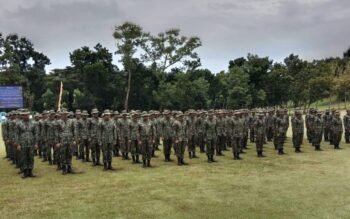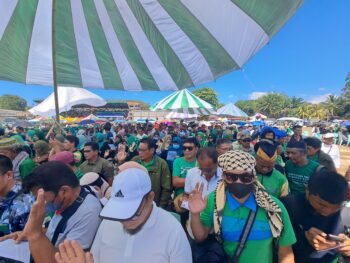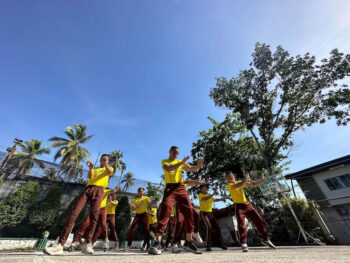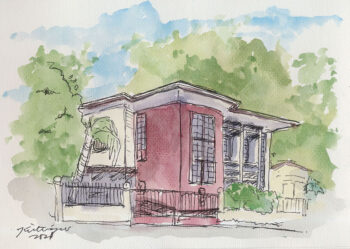
ZAMBOANGA CITY (MindaNews / 28 April)—The Muslims are done with the month-long fasting in the month of Ramadhan. While President Marcos Jr. has declared April 21 (Friday), a national holiday pursuant to Republic Act 9177 signed into law by President Gloria Macapagal-Arroyo in 2002, the muftun (chief jurisconsults) of the BARMM, and Region IX and Palawan, after the customary moon-sighting, have announced that the actual ‘īd prayer will be on Saturday (April 22). The feast known as Eid ul-Fitr (عيد الفطر), meaning, “feast of the breaking of the fast,” is actually the first day of Shawwal, the following month after Ramadhan in the Hijri calendar.
What is in a fast. The month-long fasting (singular: sawm, plural: siyam) is one of the five pillars of Islam that every mature Muslim must follow and observe for the rest of one’s life. Although those who are sick, pregnant, menstruating women, breastfeeding mothers, disabled, old and children are exempted from this obligation.
The fast begins with a pre-dawn meal called “suhūr” or colloquially referred to as “sahul.” Thereafter, a Muslim commences one’s fast from sunrise to sunset, occupying one’s self in ibadah (worship), such as observing the daily salāt (five daily prayers) and nawāfil (optional prayers); reciting, reading and reflecting on the Qur’an; performing dhikr (remembrance of Allah); as well as ‘amal salīh (righteous deeds). Ibadah (worship) can be done individually or in group, at home or the masjid (mosque), although doing it in group is preferred to encourage and look after each other during this physically and mentally grueling period. For this year, the longest fasting period is in Nuuk, Greenland, with a total of twenty (20) hours fasting period, and the shortest period is in Johannesburg, South Africa, with 11 hours and 12 minutes. In the Philippines, it is roughly 13 hours.
The sawm (fast) ends at sunset, when Muslims break their fast with a meal called iftar. This is usually preceded by the adhan, the call to prayer for Maghrib. According to the Sunnah of Prophet Muhammad (SAW), breaking the fast is as simple as eating three pieces of dates. However, because iftar and the maghrib prayer are intertwined, some people prefer to break their fast with something liquid and eat a full meal after performing the maghrib prayer. During Ramadhan, food is abundant, and sharing is expected among neighbors, particularly with those who are less fortunate. Muslims who are financially able are expected to be generous by sponsoring iftar meals. Generosity during the fasting month is not limited to food, as supplications and prayers for those experiencing challenges in their lives are also encouraged.
Fasting in a culture. Growing up in a Muslim household, we were taught that sawm teaches us about moderation and empathy. It allows our bodies to recuperate from the daily stresses of living and working, and helps us experience the hunger felt by those who have less in life, so we can be more grateful to Allah SWT for the daily provisions we have.
These days, many practices associated with excessive food and eating are not prescribed by Islam, but are more cultural practices among the different Moro ethnolinguistic groups. Seafood is in high demand across the island provinces, while ethnic delicacies are popular in the mainland provinces of the BARMM. However, the preference for ethnic foods is more related to personal cravings and ethnic practices than to the Prophet’s Sunnah. In fact, the Prophet’s practice emphasizes simplicity and moderation.
Fasting and governance. From the month-long exercise of fasting during Ramadhan, there are several lessons that can be applied to governance in the Bangsamoro Autonomous Region in Muslim Mindanao (BARMM). Here are a few examples:
From self-discipline to work ethics: Fasting requires a great deal of self-discipline, which is a valuable trait for leaders and personnel in any context. BARMM leaders and personnel can learn from the discipline required during fasting and apply it to their work in government, maintaining a strong work ethic and adhering to high standards of conduct without fear or favor.
From empathy to going the extra mile: Fasting during Ramadhan also fosters empathy for those who are less fortunate, as it reminds Muslims of the hunger and thirst experienced by those who are poor and unable to afford regular meals. BARMM leaders and personnel can take this lesson to heart and work to improve the lives of those in geographically isolated and disadvantaged areas (GIDA) or those barangays which are specifically disadvantaged due to the presence of both physical and socio-economic factors.
From patience to consistency: Fasting can be challenging, especially during long summer days, but it teaches patience and perseverance. This lesson can be applied to governance in BARMM, where leaders and personnel may face difficult challenges that require patience and persistence to overcome. In doing so, they can establish consistency in their intentions and actions, ensuring the delivery of public services is consistent.
From unity to inclusion: Ramadhan is a time for unity and solidarity among Muslims, as they come together to break their fasts at sunset. This sense of unity can be applied to BARMM governance, where leaders and personnel can work to build bridges between different communities and promote a sense of shared purpose and identity. Importantly, this realizes the principle of inclusion, as the BARMM government embraces not only those in their immediate sphere but also throughout their regional constituency, regardless of political, ethnic, religious, and similar affiliations.
Fasting, governance and accountability. These four examples are essentially the components of the current government’s slogan. Moral governance is established through moral love, which is demonstrated and strengthened during the month-long fast. Muslims are reminded that fasting during Ramadhan is not solely for oneself, but for Allah SWT. Similarly, governance is not only for those in charge, but equally for those who are governed. Prophet Muhammad SAW reminds us in a hadith that every good deed of Adam’s son is for him except fasting, which is for Allah SWT, who will reward the fasting person (Sahih al-Bukhari 5927). By inference, this principle can be applied to governance as well. The BARMM leaders and personnel’s work ethics, dedication, consistency, and inclusivity practices will be justly compensated and rewarded by Allah SWT alone.
Finally, in Sahih Muslim (1151d), a similar hadith adds, fasting is a shield. May those in leadership and position of influence use the lessons of sawm as their shield against the ills that have beset autonomy and its past failures; and to promote enlightened governance that is pursuing just, equitable, and prosperous futures for the peoples of the BARMM. Ameen.
(MindaViews is the opinion section of MindaNews. Noor Saada is a Tausug of mixed ancestry—born in Jolo, Sulu, grew up in Tawi-Tawi, studied in Zamboanga and worked in Davao, Makati and Cotabato. He is a development worker and peace advocate, former Assistant Regional Secretary of the Department of Education in the Autonomous Region in Muslim Mindanao, currently working as an independent consultant and is a member of an insider-mediation group that aims to promote intra-Moro dialogue.)







